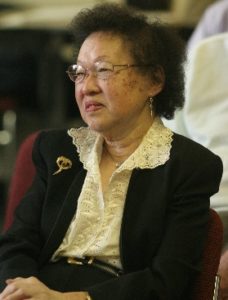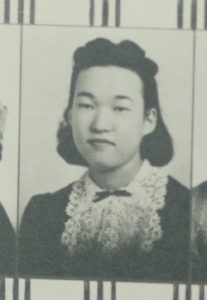A True Patiot and Citizen
By Gail Dillaway

Hiro Haji was a member of the only Japanese American family living in Monroe, Washington at the time of the bombing of Pearl Harbor, December 7, 1941. As such, in 1942, she and her family were subject to executive order 9066 issued by President Franklin D. Roosevelt and were subsequently required to move to Tule Lake, an internment camp in northern California. Hiro was born in the United States but was still subjected to a mandatory move to an internment camp due to her Japanese heritage. Regardless she remained loyal to the United States government and its efforts in World War II. During the war, her family made the ultimate sacrifice of losing her brother, Tom, who had enlisted in the army and fought against Germany. Her story is one of loyalty and patriotism to her government in spite of the limitations applied to her rights of citizenship during World War II.
Hiro Haji was a member of the only Japanese American family living in Monroe, Washington at the time of the bombing of Pearl Harbor, December 7, 1941. As such, in 1942, she and her family were subject to executive order 9066 issued by President Franklin D. Roosevelt and were subsequently required to move to Tule Lake, an internment camp in northern California. Hiro was born in the United States but was still subjected to a mandatory move to an internment camp due to her Japanese heritage. Regardless she remained loyal to the United States government and its efforts in World War II. During the war, her family made the ultimate sacrifice of losing her brother, Tom, who had enlisted in the army and fought against Germany. Her story is one of loyalty and patriotism to her government in spite of the limitations applied to her rights of citizenship during World War II.
 Hiroko (Hiro) Haji was born in 1923 in the tiny community of Bluestem Washington. Hiro was the second of three children in the family, with an older sister born in 1921 and a brother Tom, born in 1925. Hiro and her siblings were known as Nisei, or second generation Japanese Americans. Hiro’s father Ichimatsu (Nick) Haji and mother Ko Kawata Haji were both born in Japan. Mr. Haji worked for the Great Northern Railroad for much of his life. While living at Bluestem, Hiro attended a two room grade school where each room contained four grades. The classes were small and Hiro helped some of the younger children learn how to read.
Hiroko (Hiro) Haji was born in 1923 in the tiny community of Bluestem Washington. Hiro was the second of three children in the family, with an older sister born in 1921 and a brother Tom, born in 1925. Hiro and her siblings were known as Nisei, or second generation Japanese Americans. Hiro’s father Ichimatsu (Nick) Haji and mother Ko Kawata Haji were both born in Japan. Mr. Haji worked for the Great Northern Railroad for much of his life. While living at Bluestem, Hiro attended a two room grade school where each room contained four grades. The classes were small and Hiro helped some of the younger children learn how to read.
In 1933 Mr. Haji was transferred by the railroad to Skykomish where the family was to live for five years. Hiro completed 5th through 9th grade in Skykomish. At Skykomish High School Hiro was freshman class secretary in 1938, active in sports, on the honor roll and was also in the glee club where she sang as an alto. In 1938 the family moved to Monroe where Hiro continued her education. She became involved in many activities. Hiro was remembered for her friendly demeanor, her academic skill and her all-around athletic ability. Upon graduation Hiro was co-valedictorian of her 1941 graduating class.Hiro as student
After the attack on Pearl Harbor, things changed for Hiro and her family. Although Hiro stated that she could not remember any prejudice or racial slurs, even in Monroe there were some who were wary of the Haji family. At the time of the attack, Hiro was attending Business College in Seattle and along with her brother and sister decided not to attend school on December 8th, the day after the attack. Hiro was reluctant to go to Business College on Monday morning as well, but with the encouragement of the people with whom she boarded and the President of the college, she tried to continue her studies. However the signing of executive order 9066 by President Roosevelt resulted in Hiro‘s forced migration to Tule Lake in Northern California where she and her family joined 18,000 other Japanese Americans from northern California and the Northwest. Barbed wire fences constrained the internees from venturing outside the 40,000 acre camp. Armed guards in towers and on the ground outside the fence had instructions to shoot anyone who tried to escape. Each family was assigned a space in a barracks type building usually just one room about 400 square feet in size. The only furniture provided was army cots for sleeping. Their bathrooms and showers were in a central building and their meals were eaten in a central mess hall. In spite of the severe living conditions, Hiro was able to work as a bookkeeper until June of 1943 when the Haji family was allowed to leave the camp in recognition of their loyalty and good citizenship. Great Northern had a job waiting for Mr. Haji and the entire family moved to Spokane.
Hiro remained in Spokane for several months, staying at a hotel with her mother while she tried to figure out what to do next. She finally took the train to Ft. Snelling, Minnesota, where the Army had a language school. Ft. Snelling was a top security clearance facility where the Army trained soldiers who were becoming interpreters and analysts in the Pacific. Hiro became an administrative assistant here, involving herself in service to her country. She continued in this position until late 1945 when she learned that her brother, Tom, was missing in action and later declared dead at the hands of the Germans.
She left Ft. Snelling at this point, travelling by train to Spokane. Eventually moving to Oregon she married Mr. Ishida who had served in the all Japanese-American 442nd Regimental Combat Team during the war with her brother, Tom. She nursed her injured husband back to health but the marriage eventually ended. Hiro never remarried. She was able to secure a job working for the legislature as an executive assistant in Salem, Oregon where she had responsibility for the drafting and passage of legislation. She continued working in the public sector until her retirement.
On March 2, 2009 Hiro Haji Ishida received the posthumous presentation of a diploma from Monroe High School to her brother Tom Haji, who had only been a junior in high school at the time of the family’s internment. Speaking at the ceremony she said “This brings back a lot of memories”, as she clutched her brother’s diploma “It’s so nice so many of his friends remember him.” As a junior, Tom Haji had been on his way to joining his sister, Hiro, as valedictorian of his class at Monroe High School. Hiro commented that from the moment the Haji family arrived in Monroe, they were made to feel welcome. After the ceremony, Hiro was greeted with open arms by the mother of a fellow student. What made this act of kindness even more extraordinary was the fact that this mother’s son had been killed while fighting against the Japanese in the Pacific. Hiro’s positive attitude and gratitude to her country and community continued until her death. She felt that her family was judged in Monroe on their merits and not on their race. She even went so far as to say that Monroe, unlike Seattle, was supportive in spite of the anti-Japanese sentiment of the day.
Hiroko Haji died in November of 2012. She left a sizeable bequeath to the Monroe Historical Society to sustain and invigorate the museum but also to promote good will in the community and to make Monroe a better place to live for minorities. Hiro Haji remained to her death, one of Monroe’s most loyal supporters. She loved her family, her community and her country. In spite of the politics of war, she had absolute appreciation for the people of Monroe who supported her family during the 1940’s and welcomed her back cordially after the war.
Sources:
Hiro Haji. photo. 2009. By Dan Armstrong.
Keary, Polly. “Not Forgotten.” Monroe Monitor 31 Mar. 2009. Print.
Parry, Tom. Tom Haji. Monroe, 2008. Print.
Gail Dillaway interview with Tom Parry. October, 2014.
Monroe High School Yearbook. photo (1941).
© Gail Dillaway 2014 All Rights Reserved; WLP Story # 77
